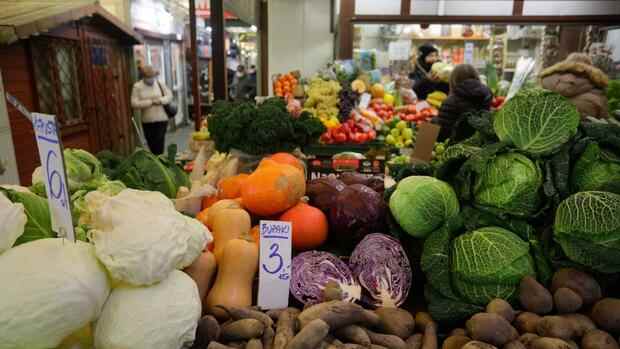The prices of goods in the country have been rising incessantly for months.
(Photo: Bloomberg)
Berlin The Polish government removes VAT on food, gas and fertilizers. The VAT rates for petrol, diesel and electricity are to be reduced significantly. Shield 2.0 is the name of Prime Minister Mateusz Morawiecki’s plan to protect the country’s residents from the ever-increasing inflation.
In December, inflation rose to a record 8.6 percent, the Polish statistics agency CIS announced last week. In the spring, the price increase was still two percent. According to a survey by the United Surveys polling institute, Polish consumers perceive the perceived inflation as much higher at 27.3 percent.
The inflation protection shield is to apply for six months and save Poles 25 billion zloty (the equivalent of 5.5 billion euros). Morawiecki’s plan is spicy because it could be another violation of EU rules: the EU Commission has not yet approved zero taxation on electricity and gas. Morawiecki, who is a member of the national populist ruling party Law and Justice (PiS), claimed that external factors such as Russia’s manipulation of gas prices, “the EU’s dogmatic climate policy” and accelerated industrial demand were responsible for 80 percent of price increases in Poland.
Trouble in the country over Russia’s gas prices
The head of the International Energy Agency also made Russia responsible for the sharp rise in gas prices for the first time: “We believe that the European gas market will be bottlenecks due to the behavior of Russia,” said IEA chief Fatih Birol.
Top jobs of the day
Find the best jobs now and
be notified by email.
In Poland the value added tax is 23 percent, but there are already reduced tax rates of eight and five percent for some food, medicines and other exceptional products. These should now drop to zero.
The lower VAT rate for fuels is reflected in a “lowering of the price for a liter of petrol and diesel at the petrol station to 1.10 euros,” said Morawiecki. The price of fuel in December was 32.9 percent higher than a year earlier. Electricity and gas prices rose by 14.3 percent.
Polish economists had anticipated a slowdown in inflation in December but were again refuted by reality. At the same time, inflation is accelerating worryingly quickly.
Series of strong monthly price increases
In December, the consumer price index rose 0.9 percent compared to November. In October, the increase was even greater, at one percent on the previous month. Such a series of strong monthly increases in the consumer price index was last seen in early 2000.
The downside of the high inflation, which hits Eastern European EU memberships particularly hard without the euro, is a further increase in key interest rates. The head of the Polish National Bank (NBP), Adam Glapiński, said on Wednesday that an increase in the main NBP interest rate to three percent would be “safe for the economy”.
The national populist PiS is continuing its policy with the zero value-added tax strategy of relieving weaker social classes through ever higher social benefits.
At the same time, for the first time since the upheaval in Poland, taxes for companies are now being increased, in some cases significantly. With its strategy, the PiS hopes for re-election next year. So far, however, it has fallen further and further behind in surveys, as the escalating dispute between Warsaw and Brussels is deterring many Poles.
More: From Russia to South America – How inflation affects the emerging economies
